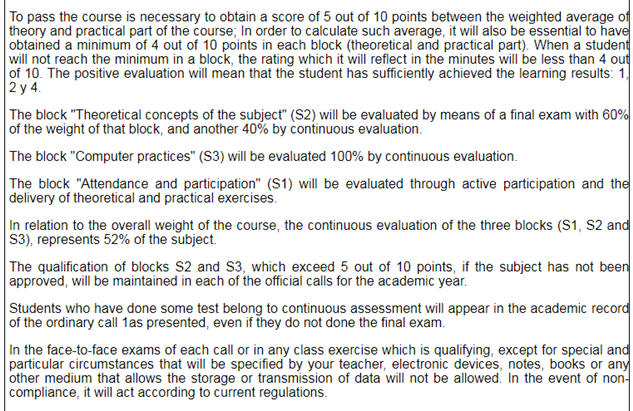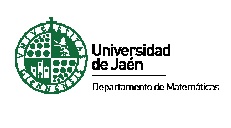|
Department of Mathematics (Algebra)
Campus Universitario, Paraje de Las
Lagunillas S/N. 23071 - Jaén |
Course: Discrete Mathematics
Degree in Computer Engineering
The subject Discrete Mathematic is part of the Mathematics matter which in turn is part of the Basic Training Module of the Degree in Computer Engineering, 2010. This subject is compulsory and consists of 6 ECTS credits which are divided into 3 theory credits (room 22 in the building A4) and 3 practical (solving problems on the blackboard and with the computer, using the Mathematica software) (room I34 in the building A4).
Syllabus - Full version (in Spanish)
2023/2024 Course schedule (![]() pdf)
pdf)
![]()
Course presentation (14-09-2023) (![]() pdf)
pdf) ![]()
The following link leads to a web page created for the development of the PIMED51_201921 teaching innovation project with the title "Edición y publicación de recursos audiovisuales para las asignaturas del área de Álgebra de la Universidad de Jaén" granted within The Teaching Innovation and Improvement Plan of the University of Jaén 2019-2023 (PIMED-UJA 2019). The objetive is to create and publish audiovisual material related to the courses of the Algebra area that serves as tool to complement the teaching-learning process of these courses:
Audiovisual resources for courses of the Algebra area
![]() (This
link takes us to a page that is under construction, if you find an error in any
of its pages you can notify us by
clicking on "FORM" in the upper right corner of the previous web)
(This
link takes us to a page that is under construction, if you find an error in any
of its pages you can notify us by
clicking on "FORM" in the upper right corner of the previous web)
Our goal in this course is to build skills and give you experience in areas such as Mathematical Reasoning (ability used by a computer engineer in constructing proofs and in writing programs), Discrete Structures (abstrac mathematical structures used to represent discrete objects and relationships between them) and Algorithmic Thinking (some problems are solved by the specification of an algorithm that can be implemented in a program). Topics covered in the course include:
Unit 1.
Fundamentals of logic. (material
for lectures from September 15th to September 29th) ![]()
Statements, connectives and truth tables. Normal forms. Adequate sets of connectives. Proof techniques. Arguments and validity.
The continuous assessment of this unit will be on Thursday, 26th of October from 14.20 to 15:30 in the building B4, classroom 25 (second floor).
Unit 2.
Sets and order relations. (material for the lectures from
September 29th to October 27th)
![]()
Basic concepts. The power set of a set. Functions. Equivalence relations. Order relations.
Unit 3.
Boole algebras. Boolean functions. (material for the lectures from
November 2nd to November 10th)
![]()
Lattices. Types of lattices. Boole algebra. Boolean functions: canonical forms. Applications: boolean circuits.
Unit 4.
Introduction to number theory: modular arithmetic. (material for the lectures from
November 16th to December 7th)
![]()
Natural number: induction and first properties. Integers. Divisibility and congruences. Bezout theorem applications. Conguences and numeral systems.
Unit 5.
Notions of computational complexity. (material for the lectures from
December 7th to December 22nd)
![]()
Algorithms. Growth functions. Complexity of an algorithm. The classes P and NP.
Qualification continuous assessment of theory
If you want to review the exercise of unit 1 and 2, it will be next --- in a tutorial time.
It is essential to reserve a time on the teacher`s website or if it is not possible during the tutorial hours proposed by the teacher, please make an appointment in other date by sending an email to the teacher.
All these titles can find them in the Library of the University of Jaen
-
Discrete and Combinatorial Mathematics. Edition: 5ª. Author: Grimaldi, Ralph P.. Publisher: Pearson Education.
-
Matemática discreta para la computación: nociones teóricas y problemas resueltos . Edition: -. Author: García Muñoz, Miguel Ángel. Publisher: Jaén: Universidad de Jaén, Servicio de Publicaciones, 2010.
-
Métodos computacionales en álgebra para informáticos: matemática discreta lógica. Edition: -. Author: García Muñoz, Miguel A.. Publisher: [Jaén]: Área de Álgebra, Universidad de Jaén, 2006.
-
Discrete mathematics. Edition: -. Author: Norman L. Biggs
-
Logic for mathematicians. Edition: Rev. ed.. Author: Hamilton, Alan G.. Publisher: Cambridge [etc] : University Press, cop. 2000.
-
Discrete mathematics and its applications. Edition: 6th ed. Author: Rosen, Kenneth H.. Publisher: Boston [etc.]: McGraw-Hill, cop.2007.
-
Mathematica: quick reference, version 2. Edition: [2nd printing]. Author: Blachman, Nancy. Publisher: Massachusetss [etc.]: Addison-Wesley, 1992.
-
Mathematica a practical approach. Edition: 2nd. ed. Author: Blachman, Nancy. Publisher: Upper Saddle River: Prentice Hall, 1999.
-
Classic algebra. Edition: -. Author: Cohn, P. M.. Publisher: Chichester [etc.]: John Wiley & Sons, impr. 2001.
-
Discrete mathematics. Edition: 4th ed. Author: Johnsonbaugh, Richard. Publisher: Upper Saddle River (New Jersey): Prentice Hall, 1997.
-
Mathematica: a system for doing mathematics by computer. Edition: 2nd. ed. Author: Wolfram, Stephen. Publisher: Reading: Addison-Wesley Publishing Company, cop. 1991.
-
2000 solved problems in discrete mathematics. Edition: -. Author: Lipschutz, Seymour. Publisher: New York [etc.] : Mac Graw-Hill, 2000.
PRACTICES
They will be two hours long, and will be held weekly during the semester. In these classes students will solve problems related to content of the subject with the help of computer. In these classes also will be presented in a more practical way, those theoretical contents of the subject which will not be exposed in the lectures. Finally, teacher will solve on the blackboard, and if it is possible, he will be used the computer, exercises of the subject that has previously been proposed to the student for the work at home. You may be asked to work individuals. In most cases, you will be asked to 'write up' your work and this will be assessed with the mark contributing to your overall exam result. You have to attend your practical classes in order to make better use of the course.
(A) Solving the proposal relationships problems:
Problem lists |
|
|
1.- |
|
|
2.- |
|
|
3.- |
|
|
4.- |
Unit 4: Number theory |
|
5.- |
|
(B) Solving problems with the help of computer using the Mathematica software.
| Computer practice classes | |||||||||||||||||||||||||||||||||||||||||||||||||||||||||||||||
|

Exam dates and qualifications
|
IMPORTANT NOTE: Any student who want assist to any call of this subject must carry some document accrediting (ID, passport, driving license, etc.). Otherwise you will not be allowed to do the exam. |
Ordinary call 1 (January):
Thursday, January 11th, 2024
![]()
Classroom: 10 Building: B4
Hour: 9:00
Extraordinary call 2 (June-July):
Friday,
July 8th, 2024
![]()
Classroom: 1, 2, 3, (4 - inglés) /(a las 12 h.: I-31, I-32, I-33, I-34) Building: B4/A4
Hour: 9:00
|
PREVIOUS YEARS EXAMS (before course 2015/16 in Spanish) |
|||
| 2023/24 |
Extraordinary
call 2 (JUNE/JULY 2024) ( |
2022/23 |
Extraordinary
call 2 (JUNE/JULY 2023) ( |
|
2021/22
|
Extraordinary
call 2 (JUNE/JULY 2022) ( |
2020/21
|
Extraordinary
call 2 (JUNE/JULY 2021) ( |
| 2019/20 |
Extraordinary
call 2 (JUNE/JULY 2020) ( |
2018/19 |
Extraordinary
call 2 (JUNE/JULY 2019) ( |
|
2017/18
|
Extraordinary
call 2 (JUNE/JULY 2018) ( |
2016/17
|
Extraordinary
call 2 (JUNE/JULY 2017) ( |
|
2015/16
|
Extraordinary
call 2 (JUNE/JULY 2016) ( |
2014/15
|
Examen Extraordinaria 2 (JUNIO/JULIO 2015) ( |
|
2013/14
|
Examen Extraordinaria 2 (JUNIO/JULIO 2014) ( |
2012/13
|
Examen Extraordinaria 2 (JUNIO/JULIO 2013)
( |
|
2011/12
|
Examen SEPTIEMBRE 2012 (
Examen JUNIO 2012 (
Examen FEBRERO 2012 ( |
2010/11
|
Examen SEPTIEMBRE 2011 (
Examen JUNIO 2011 (
Examen FEBRERO 2011 ( |

 Professor:
Miguel Ángel García Muñoz
Professor:
Miguel Ángel García Muñoz